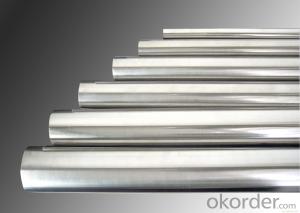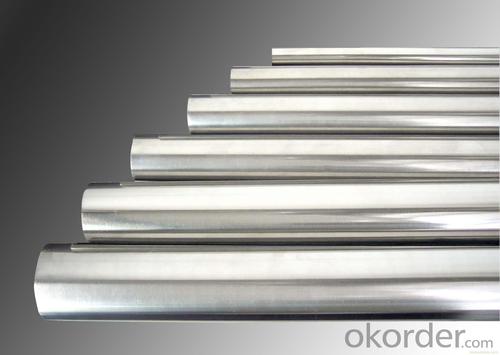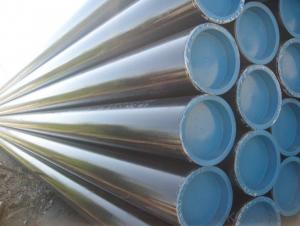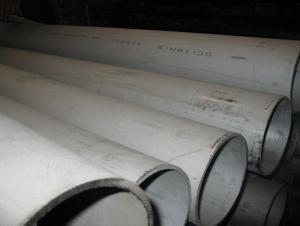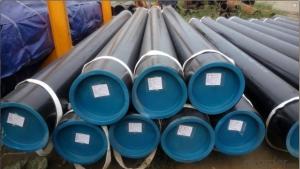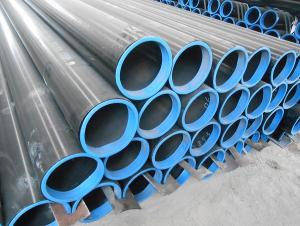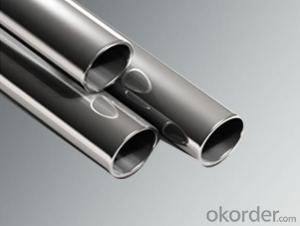Blacked Varnished Hot Rolled High Carbon Seamless Steel Pipe
- Loading Port:
- Tianjin
- Payment Terms:
- TT OR LC
- Min Order Qty:
- 30 m.t.
- Supply Capability:
- 3000 m.t./month
OKorder Service Pledge
OKorder Financial Service
You Might Also Like
Specification
Blacked Varnished Hot Rolled High Carbon Seamless Steel Pipe
1.Structure of Seamless Steel Pipe :
Seamless pipe is formed by drawing a solid billet over a piercing rod to create the hollow shell. As the manufacturing process does not include any welding, seamless pipes are perceived to be stronger and more reliable. Historically seamless pipe was regarded as withstanding pressure better than other types, and was often more easily available than welded pipe.
2.Main Features of the Seamless Steel Pipe :
• Strong heat dissipation ability
• Good visual effect
• Reasonable price
• High manufacturing accuracy
• High strength
• Small inertia resistance
3.Seamless Steel Pipe Specification:
1) Material:20#(ASTM A 106/A53 GRB.API5LGRB,GB),45#,16Mn,10#.
2) Specification range:OD:21.3-610mm,WT:6-70mm,length:6-12m or according to the requirement of clients.
3) Excutive standards:GB,ASME API5L.ASTM A 106/A53,Despite of the above standards,we can also supply seamless steel pipe with standard of DIN,JIS,and so on,and also develop new products according to the requirements of our clients!
Standard | GB, DIN, ASTM ASTM A106-2006, ASTM A53-2007 |
Grade | 10#-45#, 16Mn 10#, 20#, 45#, 16Mn |
Thickness | 8 - 33 mm |
Section Shape | Round |
Outer Diameter | 133 - 219 mm |
Place of Origin | Shandong, China (Mainland) |
Secondary Or Not | Non-secondary |
Application | Hydraulic Pipe |
Technique | Cold Drawn |
Certification | API |
Surface Treatment | factory state or painted black |
Special Pipe | API Pipe |
Alloy Or Not | Non-alloy |
Length | 5-12M |
Outer Diameter | 21.3-610mm |
Grade | 20#, 45#, Q345, API J55, API K55, API L80, API N80, API P110, A53B |
Standard | ASME, ASTM |
4. Application of Seamless Steel Pipe :
Seamless stainless pipe is used for applications that require internal pressure within the pipe such as process equipment, water treatment and marine applications. Welded pipe is used for structural applications that are exposed to corrosive environments such as marine and external applications. These include handrails, poles and support piping.
5.Packaging & Delivery
Packaging Details: | seaworthy package,bundles wrapped with strong steel strip |
Delivery Detail: | 50-60days after received 30%TT or Original LC |
6.Seamless Steel Pipe Images:
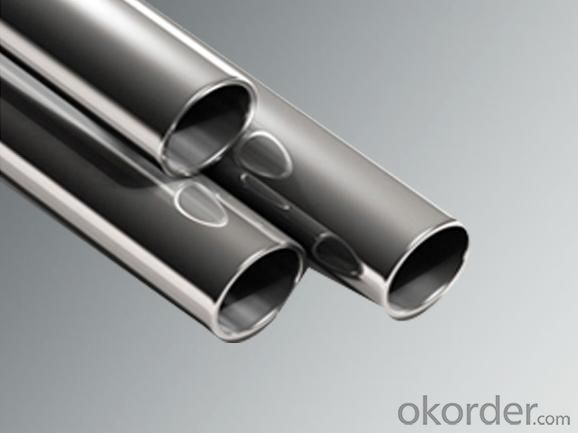
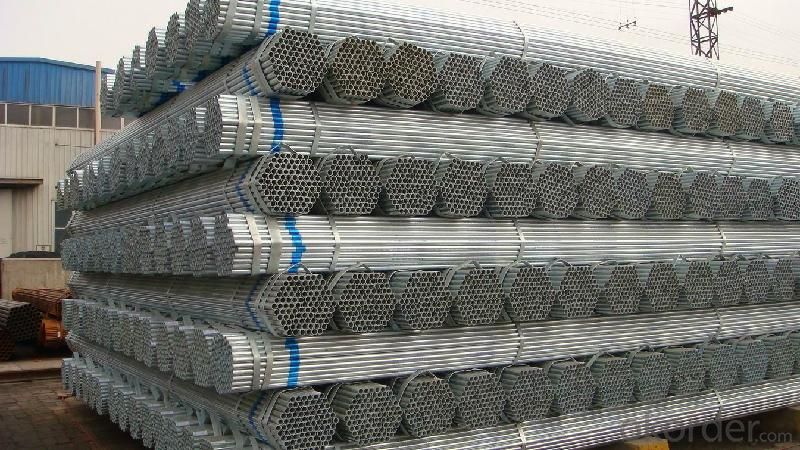
7. Company Information:
Since 2004, the trading volume of CNBM International has been doubled in 5 successive years owing to the support of superior corporations and effort of all staff. Meanwhile, we have established strategic partnerships with hundreds of domestic manufacturers and sound business relations with clients from over 120 countries. Currently, we have wholly-owned overseas subsidiaries and branches in 5 countries with a view to realize localization, which also represents an essential progress in our globalization target.In line with the business, CNBM International launched E-business platform Okorder.com.Our goal is to transform CNBM International into the global leading brand in building materials industry within 3 to 5 years through innovation and reform, by strengthening the overall management of supply chain, developing and cultivating both domestic and overseas market, improving the procedure and information system, enhancing the ability to organize resources and to provide value-added services under a professional team and a learning organization.
- Q: What are the factors that affect the price of steel pipes?
- There are several factors that can affect the price of steel pipes. Some of the key factors include the cost of raw materials such as iron ore and steel scrap, market demand and supply dynamics, production and transportation costs, tariffs and trade policies, currency exchange rates, and overall economic conditions. Additionally, factors like technological advancements, environmental regulations, and changes in industry standards can also impact the pricing of steel pipes.
- Q: How are steel pipes tested for quality?
- Steel pipes are tested for quality through various methods such as visual inspections, dimensional measurements, and various mechanical and chemical tests. These tests include assessing the pipe's surface finish, checking for any defects or cracks, measuring its dimensions, conducting tensile and impact tests, and analyzing its composition. Additionally, non-destructive testing techniques like ultrasonic testing, radiography, and magnetic particle inspection are employed to ensure the pipes meet the required quality standards.
- Q: Can steel pipes be used for conveying chemicals?
- Steel pipes are capable of conveying chemicals. Steel, being a robust and long-lasting material, can endure high pressure and temperature conditions. This makes it suitable for the transportation of diverse chemicals. Moreover, steel pipes possess exceptional resistance against corrosion, which is particularly crucial when handling corrosive substances. They find common usage in industries such as oil and gas, chemical processing, and water treatment, where the secure and efficient conveyance of chemicals is indispensable. However, it is essential to consider the specific requirements of the chemical being transported and ensure compatibility with the steel pipe. It may be necessary to select the appropriate material, including the utilization of corrosion-resistant coatings or linings, to prevent any adverse reactions between the chemicals and the steel pipe.
- Q: How are steel pipes protected against soil movement?
- Steel pipes are protected against soil movement through the use of various measures such as proper installation techniques, trench stabilization, and the implementation of protective coatings. Additionally, the pipes may be anchored or encased in concrete to prevent movement or damage caused by shifting soil.
- Q: How to make the magnetic steel, can be like a magnet?
- Magnetization. Winding the insulated wire on the object, passing in the direct current, and taking it down after a period of time.
- Q: What are the different methods of pipe inspection for steel pipes?
- Steel pipes can be inspected using various methods. Here are some commonly employed techniques: 1. Visual Inspection: Trained inspectors visually examine both the exterior and interior of the pipe to detect any visible defects or abnormalities. This preliminary method is often used before more advanced techniques are applied. 2. Magnetic Particle Inspection (MPI): By applying a magnetic field to the steel pipe and iron particles to its surface, inspectors can identify surface cracks or defects. Leakage of magnetic flux caused by these abnormalities can be detected with this method, which is particularly effective for ferromagnetic materials. 3. Ultrasonic Testing (UT): UT is a non-destructive testing method that utilizes high-frequency sound waves to identify internal defects or anomalies in steel pipes. A transducer sends ultrasonic waves into the pipe, and reflections or echoes of the sound waves are analyzed to determine the presence of defects, such as corrosion, cracks, or variations in wall thickness. 4. Radiographic Testing (RT): This method involves using X-rays or gamma rays to create an image of the internal structure of the steel pipe. The resulting image reveals any defects, such as cracks, corrosion, or weld discontinuities. RT is commonly used for inspecting welded joints. 5. Eddy Current Testing (ECT): ECT is a non-destructive testing technique that utilizes electromagnetic induction to detect surface and near-surface defects in steel pipes. By passing a coil carrying an alternating current over the pipe's surface, any changes in electrical conductivity or magnetic field caused by defects are detected and analyzed. 6. Acoustic Emission Testing (AET): AET involves detecting and analyzing high-frequency acoustic signals emitted by materials undergoing deformation or damage. In the case of steel pipes, AET can monitor and identify defects like cracks, leaks, or corrosion by analyzing the acoustic signals emitted during service or under stress. These methods are just a few examples of commonly used techniques for inspecting steel pipes. The choice of method depends on factors such as the type of defect being sought, accessibility of the pipe, desired sensitivity level, and cost and time constraints. Using a combination of inspection techniques is often recommended to ensure a thorough assessment of steel pipes.
- Q: What are the different types of joints used with steel pipes?
- There are several types of joints used with steel pipes, including threaded joints, welded joints, flanged joints, and grooved joints.
- Q: What is the difference between Schedule 40 and Schedule 80 steel pipes?
- The main difference between Schedule 40 and Schedule 80 steel pipes is their wall thickness. Schedule 80 pipes have a thicker wall compared to Schedule 40 pipes, making them more suitable for high-pressure applications and heavy-duty industrial use.
- Q: How do steel pipes differ from other types of pipes?
- Steel pipes possess several distinct characteristics that set them apart from other pipe types. Primarily, their strength and durability are well-known. They exhibit remarkable resistance to heat, pressure, and corrosion, rendering them suitable for numerous applications. Additionally, their robustness allows them to bear heavy loads and offer an extended service life. One distinguishing feature of steel pipes lies in their versatility. They can be manufactured in various shapes and sizes to fulfill specific project requirements. This adaptability has contributed to their popularity across a diverse range of industries, including construction, oil and gas, water treatment, and manufacturing. Moreover, steel pipes exhibit exceptional thermal conductivity, facilitating efficient heat transfer between different areas. Consequently, they prove suitable for applications involving heating and cooling systems, as well as the transportation of hot fluids or gases. Furthermore, steel pipes are renowned for their resistance to fire. They possess a high melting point and are not easily ignited or conducive to the spread of flames. This characteristic is particularly critical in applications where fire safety is a concern, such as buildings or industrial facilities. Lastly, although steel pipes may entail a higher initial cost compared to other pipe types, their long-term benefits, such as durability and low maintenance requirements, often outweigh the initial investment. Additionally, steel pipes are highly recyclable, making them an environmentally friendly choice. In summary, steel pipes stand out due to their strength, durability, versatility, excellent thermal conductivity, fire resistance, and recyclability. These remarkable qualities establish steel pipes as the preferred option for a wide range of applications across various industries.
- Q: Can steel pipes be used for underground sewer lines?
- Indeed, underground sewer lines can certainly utilize steel pipes. Given their robustness, resilience, and resistance against corrosion, steel pipes are widely employed in sewer systems. They possess the capacity to withstand the immense burden of soil and external forces, rendering them highly suitable for subterranean purposes. Moreover, steel pipes boast an extended lifespan and excel in efficiently conveying wastewater and sewage over numerous years. However, it remains crucial to guarantee the appropriate coating or lining of these steel pipes to avert corrosion and further elongate their durability.
Send your message to us
Blacked Varnished Hot Rolled High Carbon Seamless Steel Pipe
- Loading Port:
- Tianjin
- Payment Terms:
- TT OR LC
- Min Order Qty:
- 30 m.t.
- Supply Capability:
- 3000 m.t./month
OKorder Service Pledge
OKorder Financial Service
Similar products
Hot products
Hot Searches
Related keywords
